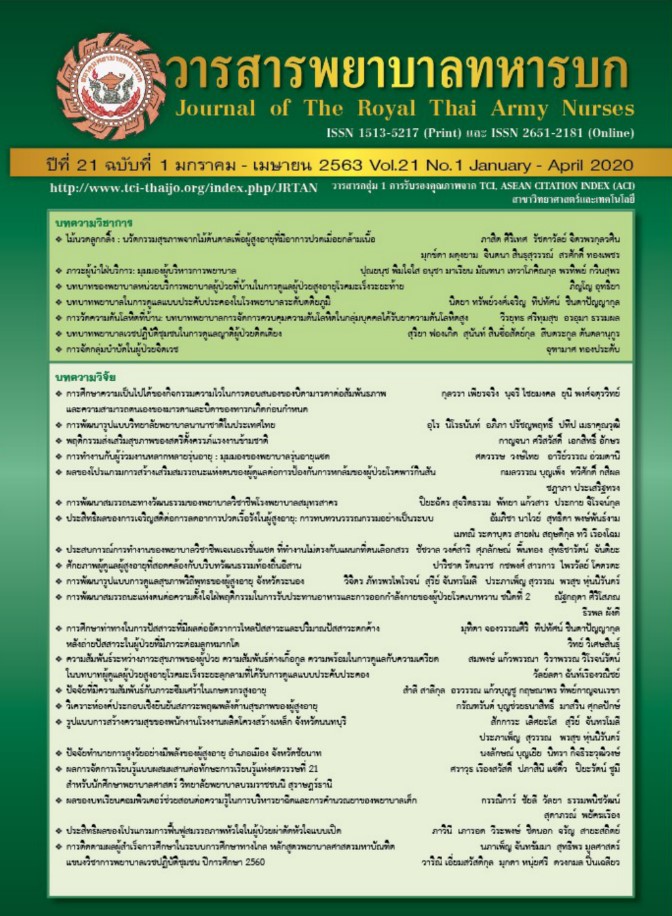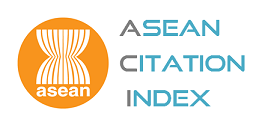การทำงานกับผู้ร่วมงานหลากหลายรุ่นอายุ: มุมมองของพยาบาลรุ่นอายุแซด
คำสำคัญ:
พยาบาลรุ่นอายุแซด, การวิจัยเชิงคุณภาพ, ผู้ร่วมงานหลากหลายรุ่นอายุบทคัดย่อ
การศึกษาครั้งนี้มีวัตถุประสงค์ เพื่อบรรยายประสบการณ์การปฏิบัติงานของพยาบาลรุ่นอายุแซด โรงพยาบาลมหาวิทยาลัย แห่งหนึ่ง โดยใช้ระเบียบวิธีการวิจัยเชิงคุณภาพแบบปรากฏการณ์วิทยาการตีความ ตามแนวคิดของ Heidegger ผู้ให้ข้อมูล คือ พยาบาลวิชาชีพที่มีอายุไม่เกิน 27 ปี และมีประสบการณ์การปฏิบัติงานพยาบาลเต็มเวลา อย่างน้อย 3 ปี จำนวน 12 ราย เก็บรวบรวมข้อมูลด้วยวิธีการสัมภาษณ์เชิงลึก การบันทึกเทป การสังเกต และการบันทึกภาคสนาม นำข้อมูลทั้งหมดมาวิเคราะห์ เนื้อหาตามวิธีการของ Van Manen (1990)
ผลการศึกษา พบว่า การทำงานกับผู้ร่วมงานหลากหลายรุ่นอายุ ตามมุมมองของพยาบาลรุ่นอายุแซด ประกอบด้วย 5 ประเด็น คือ 1) ทำงานกับแพทย์ต้องเข้าใจว่าแพทย์แต่ละวัยเข้าถึงได้ต่างกัน 2) ทำงานกับหัวหน้าต้องปรับตัวเข้าหา เพื่อปรึกษา ปัญหาการงาน 3) เรียนรู้และปรับตัวเข้าหาพยาบาลระดับปฏิบัติการหลากหลายรุ่น 4) ผู้ช่วยพยาบาลต่างวัย ต้องจัดการให้ทำงาน ตามที่มอบหมาย และ 5) แม่บ้านหอผู้ป่วยชอบโวยวาย ต้องใช้เทคนิคการเจรจา
ผลการศึกษานี้ชี้ให้เห็นว่า พยาบาลรุ่นอายุแซดปรับตัวเข้าได้ดีกับผู้ร่วมงานที่มีลักษณะเปิดกว้างทางความคิดและยืดหยุ่น วิธีการทำงาน ดังนั้น ผู้บริหารสามารถนำผลการวิจัยนี้ไปประยุกต์ใช้ในการบริหารพยาบาลรุ่นอายุแซดต่อไป
Downloads
เอกสารอ้างอิง
Iorgulescu MC. Generation Z and its perception of work. CrossCultural Management Journal 2016; 18: 47-54.
Singh AP, Dangmei J. Understaning the generation Z: The future workforce . South -Asian Journal of Multidisciplinary Studies 2016; 3: 1-5.
Onsri P. The attitude toward nursing profession among the generation Z population: The secondary school case study. Journal of The Royal Thai Army Nurses 2017; 18: 170-179.(in Thai).
Christensen SS, Wilson BL, Edelman LS. Can I relate? A review and guide for nurse managers in leading generations. Journal of Nursing Management 2018; 26: 689-695.
Flippin CS. Generation Z in the workplace : Helping the newest generation in the workforce build successful working relationships and career paths. Middletown: Paperback; 2017.
Department of nursing a university hospital. Career pathways for nurses. Annual report of faculty of medicine a university hospital. Bangkok; 2017. (in Thai).
Oumtanee A. Qualitative research in nursing. 3nded. Bangkok: Chulalongkorn University printing house; 2016. (in Thai).
van Manen M. Researching lived experience. Canada: The Arthouses press; 1990.
Missen K, McKenna L, Beauchamp A. Registered nurses’ perceptions of new nursing graduates’ clinical competence: A systematic integrative review. Nursing and Health Sciences 2016; 18:143-153.
Kuewong G. Oumtanee A. Stress of newly graduated nurses working at an intensive care unit. Journal of The Royal Thai Army Nurses 2017; 18: 158-165. (in Thai).
Wongsaree C. Teaching to critical thinking in generation Z nursing student: A review of literature. Journal of The Royal Thai Army Nurses 2019; 20: 21-30. (in Thai).
Bell JA. Five generations in the nursing workforce: Implications for nursing professional development. Journal of Nurses Professional Development 2013; 29: 205-210.
Smith-Trudeau P. Generation Z nurses have arrived. Are you ready? New Hampshire Nursing News 2016; 40: 13-14.
Goh E, Lee C. A workforce to be reckoned with: The emerging pivotal generation Z hospitality workforce. International Journal of Hospitality Management 2018; 73: 20-28.
Hampton DC, Keys Y. Generation Z students: Will they change our nursing classrooms? Journal of Nursing Education and Practice 2017; 7: 111-115.
ดาวน์โหลด
เผยแพร่แล้ว
รูปแบบการอ้างอิง
ฉบับ
ประเภทบทความ
สัญญาอนุญาต
บทความหรือข้อคิดเห็นใดใดที่ปรากฏในวารสารพยาบาลทหารบกเป็นวรรณกรรมของผู้เขียน ซึ่งบรรณาธิการหรือสมาคมพยาบาลทหารบก ไม่จำเป็นต้องเห็นด้วย
บทความที่ได้รับการตีพิมพ์เป็นลิขสิทธิ์ของวารสารพยาบาลทหารบก
The ideas and opinions expressed in the Journal of The Royal Thai Army Nurses are those of the authors and not necessarily those
of the editor or Royal Thai Army Nurses Association.







